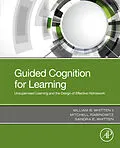Guided Cognition for Learning: Unsupervised Learning and the Design of Effective Homework details a new instructional design approach called Guided Cognition where homework tasks are designed to guide learners to engage in specific, observable cognitive events that are hypothesized to elicit underlying theoretical cognitive processes that result in learning. Outlining the results of twenty-six experiments completed over the course of eight years, the book tells a significant story about the generality of Guided Cognition instructional design to improve comprehension and recall by students of varying ages and ability levels. - Explains why unsupervised learning is a major part of education - Reviews the history of homework in American education - Shows that quality of homework is more important than quantity - Illustrates how Guided Cognition-designed homework improves learning for literature and mathematics - Compares Guided Cognition to other types of instructional design - Analyzes how the surface structure of Guided Cognition tasks relate to underlying psychological processes - Discusses the effects of the internet on learning - Presents applications that facilitate lifelong learning - Includes an appendix of frames and guidelines for authoring Guided Cognition questions and tasks
Autorentext
William B. Whitten II earned his Ph.D. in experimental/cognitive psychology at the University of Michigan's Human Performance Center. He has contributed broadly to human memory studies in cognitive psychology, to program management for basic psychology research in government, to human-machine interaction design in industry, and to the application of basic psychological science to the improvement of education. Dr. Whitten served on the faculties of the University of Michigan and the State University of New York at Albany, where he published basic research on human memory. He next served as the Assistant Director of Personnel and Training Research Programs at the Office of Naval Research, where he managed a nationwide, 30-location, basic research program on cognitive processes, human information processing, and computer-aided instruction. Following this, Dr. Whitten performed and managed research and development in the communications industry. During his career at Bell Laboratories and subsequently at AT&T Labs, Dr. Whitten led user-centered systems engineering and human factors design groups, including the User Experience Engineering Division and the Multimedia Applications and User Interfaces Division. At AT&T Labs, he was appointed as the first Technology Leader of User Experience Engineering. At Fordham University, Dr. Whitten was appointed as the first Distinguished Research Scholar in the Graduate School of Education, established the Center for Learning in Unsupervised Environments, and performed the research reported in this book. Dr. Whitten is a Fellow of the Psychonomic Society and of the Association for Psychological Science.
Inhalt
1. The Importance of Unsupervised Individual Learning in Education 2. Guided Cognition: A New Approach to Designing Effective Homework 3. Guided Cognition Effects in Learning Literature 4. Guided Cognition Effects in Learning Mathematics 5. Students' Perceptions and Preferences 6. Theoretical Considerations 7. Improving Unsupervised Individual Learning 8. Benefits and Applications of Guided Cognition Design
